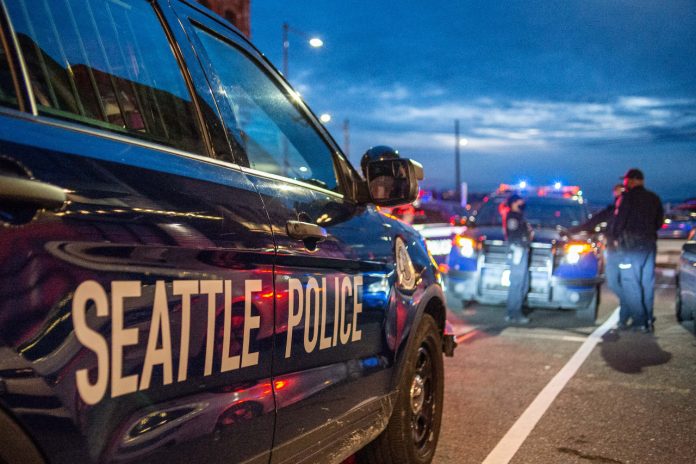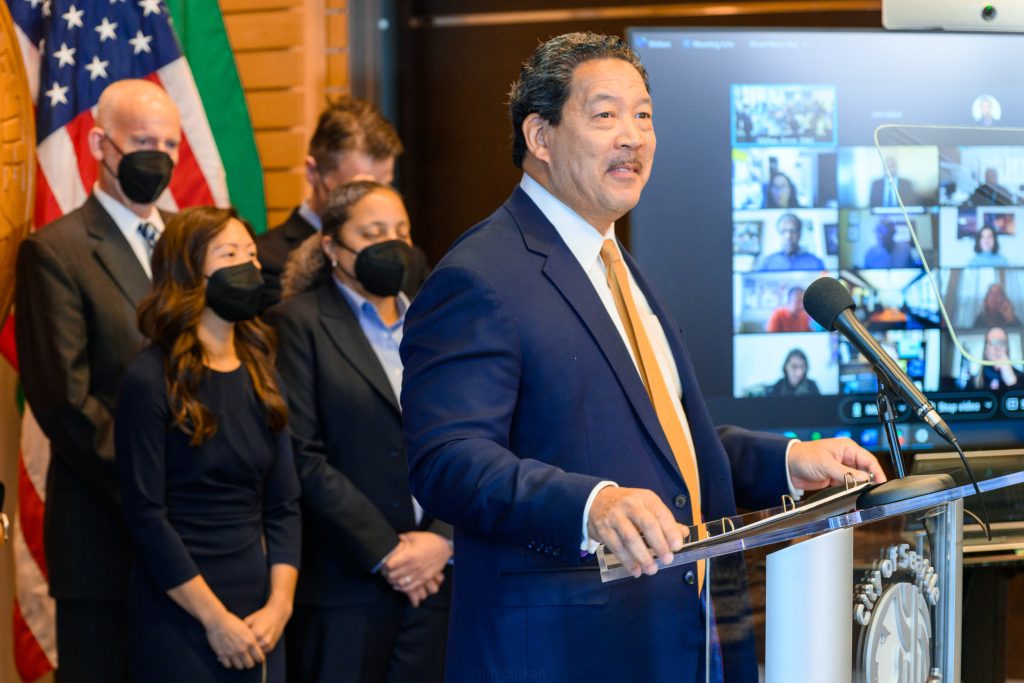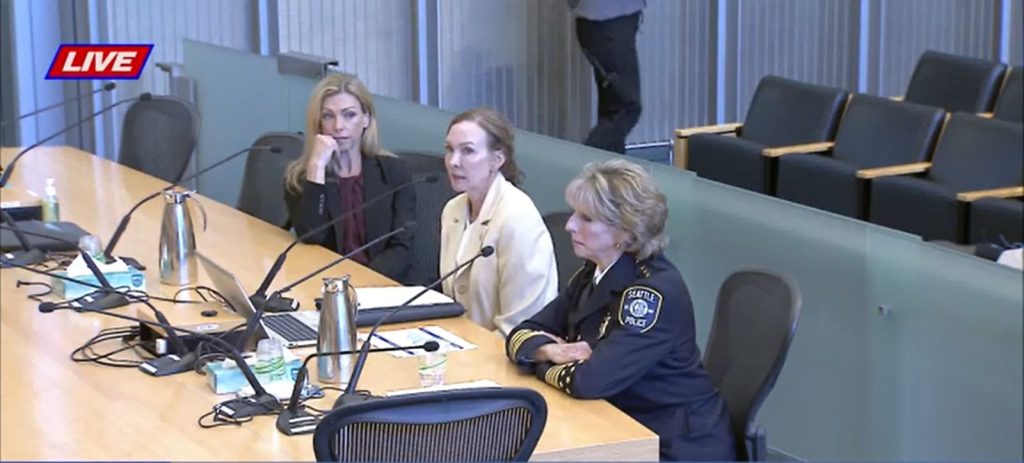
Almost 14 years ago, a bevy of Seattle’s community organizations asked the US Department of Justice (DOJ) to investigate a pattern of excessive use of force by the Seattle Police Department (SPD), in the wake of police killing John T. Williams, a deaf Indigenous woodcarver. As a result of this investigation, the City of Seattle and the DOJ negotiated a settlement to reform SPD, and thus the consent decree was born.
After more than a decade and at least $200 million spent to comply with the consent decree, the City of Seattle is struggling towards the finish line and has not yet proven its full compliance with the decree’s requirements. Determining compliance is up to Senior Judge James Robart of the United States District Court for the Western District of Washington.
On Wednesday, Judge Robart convened a hearing to review Seattle’s status in reaching that goal before the last provisions of the consent decree can be lifted. Robart found that the City is close to compliance once it submits SPD’s revised crowd control policy. He does have lingering concerns about bias-free policing and accountability, particularly given the most recent Seattle Police Officers Guild (SPOG) contract.
In 2019, after several years of SPD reform attempts, Robart found the city had fallen partially out of compliance with the consent decree because of its new labor agreement with SPOG. SPOG contracts interfering with reform efforts has turned into a pattern for Seattle.
The history of the consent decree and SPOG contracts
The 2018 SPOG contract undermined the groundbreaking accountability ordinance passed by city council in 2017. Among other reforms, this new ordinance would have allowed the Office of Police Accountability (OPA) to be civilianized and given the OPA both subpoena powers and more say into criminal cases brought against police officers. It would have also removed hurdles to proving officer misconduct. Currently, procedures weigh heavily in an officer’s favor, providing plenty of paths to evade accountability..
Seven years later, the original intent and promise of the accountability ordinance has never been realized.
When the City reached an interim agreement with SPOG this spring, accountability advocates were disappointed at the lack of progress in accountability measures. Notably, the new SPOG contract, which the city council passed in a 8-to-1 vote in May, neither completes implementation of the accountability ordinance nor reaches the same accountability standards agreed upon by the Seattle Police Management Association (SPMA), which represents SPD lieutenants and captains. SPMA is much smaller than SPOG, which represents SPD’s rank-and-file officers.
The new SPOG contract did, however, give SPOG members a huge 23% raise, including $57.1 million worth of back pay, which far outpaced raises for other public employees. This pay raise accounted for a $47 million of SPD’s $62 million increase in Mayor Bruce Harrell’s proposed 2025 budget.
The Community Police Commission (CPC) stated in their recent amicus brief that Seattle has not yet made sufficient progress towards implementing the accountability ordinance to bring the consent decree to an end. They pointed out that the city is in a very similar place in terms of police accountability as it was in 2019 when Robart found it out of compliance.
About the new interim SPOG contract, the CPC wrote, “While the CPC supports what this represents in terms of ensuring fair wages and appreciates the nexus between good pay and accountable policing, the Interim Agreement unfortunately reflects little other progress—and indeed, continued backsliding—on implementation of strong accountability standards.”
They also asserted that the City had promised much more to both the Court and the public than what was being delivered.
Judge Robart’s remarks
At this week’s hearing, Robart appeared to agree with the CPC’s assessment of the new SPOG contract. When Assistant City Attorney Kerala Cowart stated that under the consent decree, discipline was adequate for SPD to police constitutionally, Robart said there was “a great deal of public sentiment to the contrary.”
He went on to say that he is a proponent of police officers receiving fair pay but was concerned that the contract makes “a substantial increase… without making significant changes to the disciplinary and accountability system” and particularly called out the new contract’s failure to realize the accountability ordinance.
He spoke acerbically about the elevated standard of review that was maintained in the new contract and was troubled about the continued reliance on arbitrators to approve disciplinary decisions, citing several recent cases in which arbitrators overturned police chiefs’ termination decisions.
Deputy Mayor Tim Burgess expressed a different viewpoint to The Urbanist, citing how in the Adley Shepherd case, the city succeeded in getting the arbitrator’s decision overturned in court. The city is currently appealing another case, heard last week, where an arbitrator overturned an SPD termination decision related to use of force, awarding the officer in question backpay. While the City sometimes prevails on appeal, the second guessing by arbitrators delays discipline and heap legal costs on the City, gumming up the accountability system.

When asked Burgess about the possibility of the next SPOG contract going to interest arbitration, Burgess was not optimistic that an arbitrator’s findings would be in the City’s favor. He said he thought the odds of a positive outcome for the city would be 50/50.
Robart continued his line of questioning about collective bargaining with assistant United States attorney Matt Waldrop, asking about an article he’d read about how Washington DC police can no longer bargain for anything but wages and working conditions, meaning accountability and disciplinary processes are no longer brought to the table. Waldrop explained that Washington DC has a unique status as a district that allowed them to make what amounts to state legislative changes through their own district council.
Even after Robart shot down the idea that the most recent SPOG contract made concrete advances, Cowart maintained that “reform is a continuous process, not a destination.” She said the city is continuing to negotiate with SPOG, meeting twice monthly, but that the interim contract was necessary due to SPD’s staffing shortage, which could impact SPD’s ability to maintain the reforms mandated by the consent decree.
She also cited the new Community Assisted Response and Engagement (CARE) team as freeing up resources for SPD. Robart himself expressed delight in the new CARE team. However, it went unmentioned that the CARE team remains extremely limited in scope and the type of calls it can handle, another key issue that needs to be addressed in the next SPOG contract.
By the end of the hearing, Robart indicated that because he doesn’t have the power to influence or change the collective bargaining agreements reached by SPOG and the City, he won’t maintain the consent decree in spite of a SPOG contract he views as a failure.
New less lethal weapon legislation
The Mayor’s Office submitted new legislation to the City Council on Tuesday that, if adopted, would alter the less lethal weapon ordinances passed in 2020 and 2021 in the wake of the George Floyd protests and the well-documented violent response by SPD. SPD’s actions during these protests resulted in over 19,000 complaints to the OPA, as well as several lawsuits, costing at least $10 million in settlements thus far.
The new legislation would make several changes. First, it removes the personal right of action that allows individuals to sue the city for physical or emotional damages caused by SPD’s inappropriate use of less lethal weapons. This right was perhaps one of the most controversial aspects of the previous less lethal weapon ordinances.
The mayor’s proposal lifts those ordinances’ prohibition on mutual aid law enforcement agencies, such as the King County Sheriff’s Office and Washington State Patrol, using less lethal weapons. SPD has said this prohibition led to all such partners refusing to assist them in future.
“It is not prudent to impose this [mutual aid] prohibition, especially given the volatile environment surrounding our national political processes and the upcoming major civic events that will draw millions of people to Seattle,” Burgess wrote in a letter to Council.
The legislation removes the previous mentions of specific less lethal weapons, instead relying on SPD’s policy to determine which of these weapons will be available for use in any given situation. Once Robart is no longer monitoring SPD through the consent decree, that decision will be left entirely to SPD’s discretion, including whether they use weapons such as blast balls, the use of which led to a judge finding SPD in contempt of court back in 2020.
The mayor’s proposal does impose some restrictions on how and when less lethal weapons are used. It also specifically requires that SPD policy be consistent with state law around the use of tear gas, with some additional requirements imposed.
The City argued this new legislation is necessary for SPD to finish drafting its second revision of its crowd control policy. The policy would then be submitted to the court for review. Robart expressed impatience that this task hasn’t already been completed, as the court asked for this to be done in September of 2023.
Meanwhile, since 2019, the Office of the Inspector General (OIG), the third leg of Seattle’s three-pronged police accountability “stool” along with the CPC and OPA, had been working on an audit of SPD’s policies on the use of mutual aid from outside police forces (typically for crowd control purposes). In many instances, those mutual aid forces have brought in crowd control weapons that SPD was banned from using. However, that audit was repeatedly delayed, obstructed, and ultimately downgraded to a six-page review, rather than a full audit, as it faced resistance from SPD and waning support for civilian-led reforms at City Hall, as The Urbanist recently reported.
Use of Force and Bias-Free Policing
The last two issues discussed at the hearing were the OIG’s brand new report on SPD’s use of force during crisis response and SPD’s progress at ensuring bias-free policing.
Between 2021 and 2023, the OIG found that SPD used force in less than 2% of all crisis contacts. They used force 520 times in these situations, and used the highest amount of force eight times. This marks a large improvement from their use of force in crisis situations in the past.
SPD’s detentions invoking the Involuntary Treatment Act did increase by almost 5% during this time period. There was also a decrease of 4.4% in referrals to services. Crisis contact complaints to the OPA increased between 2022 and 2023, from 35 to 54.
Meanwhile, while research has shown that between 2015 and 2021, the rates of police killings per homicide in Seattle were significantly higher than in other areas of the US, with one out of ten killings being done by a police officer, we don’t have analysis of this data for 2022 and 2023.
Robart said he thought the OIG is one of the most significant successes under the consent decree. He spoke of the need for an independent voice such as the OIG to conduct reviews based on the facts rather than impressions. The Urbanist’s aforementioned reporting on the OIG’s stymied mutual aid audit does call into question that independence.
Robart was less sanguine about SPD’s efforts when it comes to bias-free policing, saying it continues to be a significant problem. He did applaud SPD for not trying to hide this and agreed that work has been done. The DOJ said the consent decree has laid a foundation for improvement in this area due to the transparency and availability of the data in this regard.
The problem, however, remains stark. In 2022 the Seattle Police Monitor found that more than one out of every 20 Terry stops and roughly one out of every seven frisks conducted by SPD are unconstitutional. SPD detains Black and Indigenous people at much higher rates than White people, even though White people are more likely to be found with a weapon when frisked.
Robart also spoke of the difficulty of the work of the consent decree. Since its inception 12 years ago, there have been six mayors and seven police chiefs, which he said have not been good for either the stability of the police department or the administration of the decree.
Burgess told The Urbanist he expects the Mayor to appoint a new Chief of Police by the end of the year, which would make eight police chiefs during the duration of the consent decree.

After initially arguing that hiring a police chief from within SPD’s ranks was best and selecting Adrian Diaz to lead his department, Harrell more recently suggested — after having to oust Diaz in May amid multiple scandals — that an external permanent police chief hire may be preferable. Interim police chief Sue Rahr also came as a retired King County Sheriff rather than from SPD ranks.
The end is in sight
The new less lethal weapon legislation has now been transmitted to Seattle City Council, who will choose whether to handle the matter now or wait until after budget season at the end of November. Should they pass the legislation, the city will be able to file SPD’s new crowd control policy with the court.
The City and the DOJ will then most likely file a joint motion to terminate the consent decree, assuming the policy passes muster with the court.
While Robart doesn’t see the consent decree ending by the end of the year, he concluded that the city is close to meeting its obligations. But as this long process reaches its final chapters, his displeasure at his inability to impact the accountability provisions in the SPOG contract remains front of mind.
Amy Sundberg is the publisher of Notes from the Emerald City, a weekly newsletter on Seattle politics and policy with a particular focus on public safety, police accountability, and the criminal legal system. She also writes science fiction, fantasy, and horror novels. She is particularly fond of Seattle’s parks, where she can often be found walking her little dog.

